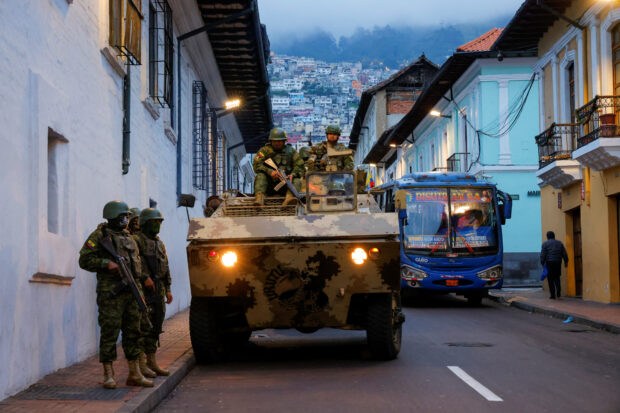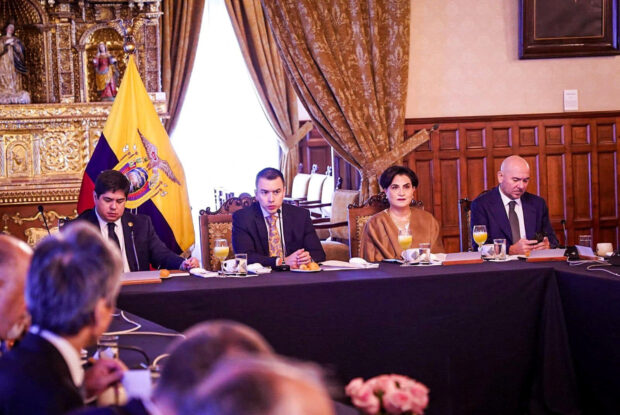Ecuador president says country is at war with drug gangs

Soldiers in an armored vehicle patrol the city’s historic center following an outbreak of violence a day after Ecuador’s President Daniel Noboa declared a 60-day state of emergency following the disappearance of Adolfo Macias, leader of the Los Choneros criminal gang, from the prison where he was serving a 34-year sentence, in Quito, Ecuador, January 9, 2024. REUTERS/Karen Toro
QUITO — Ecuador President Daniel Noboa said Wednesday his country was “at war” with drug gangs who are holding prison guards hostage, amid a dramatic surge in violence that saw gunmen briefly take over a TV live broadcast and explosions in multiple cities.
Noboa on Tuesday named 22 gangs as terrorist organizations, making them official military targets. The president took power in November, pledging to tackle a growing security problem caused by a rise in drug-trafficking gangs transporting cocaine through Ecuador.
“We are at war, and we cannot cede in the face of these terrorist groups,” Noboa told radio station Canela Radio on Wednesday. He estimated that some 20,000 crime gang members are active in Ecuador.
Streets in the capital, Quito, and the port city of Guayaquil were quieter than usual on Wednesday, with many businesses closed or working remotely and schools shuttered.
READ: What is happening in Ecuador?
Article continues after this advertisementThe hostage-takings of more than 130 prison guards and staff, which began in the early hours of Monday, and the apparent escape of Los Choneros gang leader Adolfo Macias from prison over the weekend spurred Noboa to declare a 60-day state of emergency.
Article continues after this advertisementHe hardened the decree on Tuesday after a series of explosions around the country, and the takeover of the TC television station by balaclava-clad gunmen live on air.
Every effort is being made to rescue the prison hostages, Noboa said.
Some 329 people, mostly members of gangs like Los Choneros, Los Lobos, and Los Tiguerones, have been arrested since the state of emergency began, armed forces commander Jaime Vela said at a press conference on Wednesday evening.
“There is no hostage who has been murdered,” Vela added, in response to a question about harrowing videos circulating on social media which showed prison staff being subjected to extreme violence, including being shot and hanging.
Reuters could not immediately verify the authenticity of the videos.
READ: Ecuador under state of emergency, curfew after narco boss escapes
The government has said the latest wave of violence is a reaction to Noboa’s plan to build new high-security prisons for gang leaders. Noboa told the radio station a design for two new facilities will be made public tomorrow.
“Things are crystallizing, but we must be conscious that this can’t be done overnight,” Vela said about the prisons.
The SNAI prisons agency has said guards account for 125 of the hostages, while 14 are administrative staff. Eleven people were freed on Tuesday, it said.
A journalist who was held hostage during the TC station takeover and forced at gunpoint to appear on camera told Reuters in an interview that the experience was “surreal.”
READ: Ecuador TV studio attacked by armed men during live broadcast

A meeting with the diplomatic corps, led by Ecuador’s President Daniel Noboa and Chancellor Gabriela Sommerfeld, is held following a wave of violence around the nation in Quito, Ecuador, on January 10, 2024. Cancilleria Ecuador via Facebook/Handout via REUTERS
Prisoner reparations
Noboa said the country will begin deporting foreign prisoners, especially Colombians, to reduce prison populations and spending this week.
There are some 1,500 Colombians in prison in Ecuador, Noboa said, and prisoners from Colombia, Peru and Venezuela account for 90% of jailed foreigners.
“We are investing more on those 1,500 people than on school breakfasts for our children. It’s not an extradition, it’s based on previous international agreements,” Noboa said.
READ: Ecuador’s youngest elected president faces a practically impossible task
Ecuadorean sentences would only be recognized in Colombia if prisoners arrive via formal repatriation, agreed with Colombian authorities, Colombian Justice Minister Nestor Osuna told journalists. If Colombian prisoners are simply expelled, they would only be jailed if they have charges pending at home.
“If there is an expulsion, we’ll look at how many people, if they arrive at the border, really need to be detained by Colombian authorities,” Osuna said, expressing his “genuine solidarity” with the Ecuadorean people.
Colombia said on Wednesday it would increase military presence and controls along its nearly 600-kilometer (370-mile) border with Ecuador.
Noboa said the best way to safeguard the economy and foreign investment would be to improve security and ensure the rule of law.
READ: How Ecuador became one of the most violent countries in Latin America
The government dispatched security forces to ports to safeguard exports like fruit and cocoa, while the energy ministry said the oil and mining sectors were functioning normally.
The Chinese embassy and consulates were temporarily shut, said China, a major investor in Ecuador.
Residents out in the morning said it felt like a return to pandemic lockdowns.
“It’s horrible, the streets are very empty,” said Guayaquil security guard Rodolfo Tuaz, 40. “It’s a very cold environment as if there were a new COVID.”